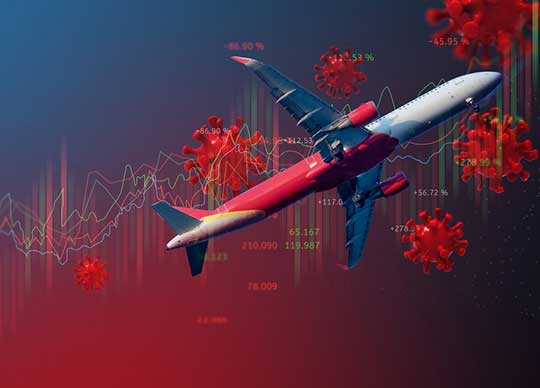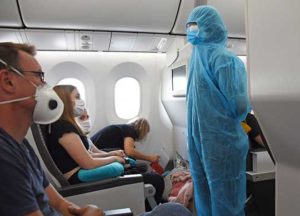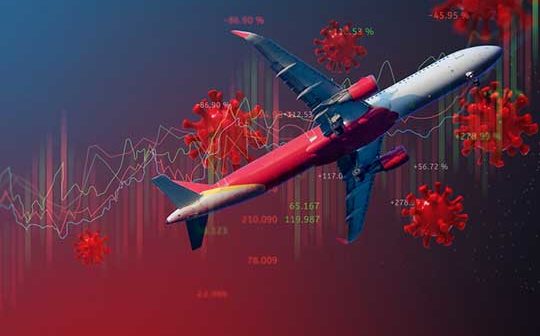
By Staff Writer
The world of aviation and cargo is in the midst of massive transformation. Peter Gerber, CEO of Brussels Airlines, has predicted a strong outcome for the industry, despite the changes to rules and regulations in the wake of the pandemic.
“The biggest question mark we have at the moment is, of course, how business travel, business traffic, will develop? For the moment we still see quite a weak demand on business travel, but also there it’s a little bit mixed. We see the small and medium-sized enterprises; they are already coming back a little bit more to business travel. Also, what I would call essential business travel is coming back, so mechanics who need to fly, parliamentarians who need to talk to each other to get things done, also NGOs, so there are a lot of people who need to travel now, and they, of course, start to travel again.”
“Very big companies still tend to be a little bit reluctant, so we don’t know. And the second big question, for the moment, is the intercontinental travel, still not really open between the US and the EU, which causes us some troubles. The second thing is also when we look at Asia, it’s not so much a problem of Brussels Airlines, but of the big airlines’ groups. There’s still a lot of restrictions in China and Japan, and for the moment we can’t see how this is changing”.
The former CEO of Lufthansa Cargo also warns the pandemic is a fair way off being wiped out, especially in Europe, but the market needs to manage through it despite the uncertainty.
“I think we have to expect maybe here and there, again an unpleasant winter, especially as we also don’t know how this fourth wave is developing. Will there be more variants of the virus? Something like that. I expect, maybe, what I could call a really cold winter, but on the other hand, I’m quite optimistic when we look into the summer, which means for us, as you know, airlines start with the summer flight by the end of March, and so I expect normally worst being over then.”
Also wary but optimistic of the changes that have hit aviation in the last 18 months, is Martin Gauss, airBaltic Executive Board Chairman and CEO.
 “We became the largest operator in the world of the Airbus A220-300 and we are now the largest in Europe on the A220. So that little airline from little Latvia has done a lot of change. And what we see now, and this week, looking forward, an unusual behaviour of passenger bookings. We have 84% of our passengers booking only the next eight weeks in advance. And that is the trend we have seen now for several months, so nothing beyond eight weeks in advance, but it hasn’t stopped. Normally at this time of the year, we would see it drop already for five weeks in bookings, but that hasn’t happened yet. So we’re waiting basically every day, when are the things going forward dropping, but they’re just maintained. So that is something new. That, of course, makes us very happy right now, but still we are on a significantly lower level than we were 2019”.
“We became the largest operator in the world of the Airbus A220-300 and we are now the largest in Europe on the A220. So that little airline from little Latvia has done a lot of change. And what we see now, and this week, looking forward, an unusual behaviour of passenger bookings. We have 84% of our passengers booking only the next eight weeks in advance. And that is the trend we have seen now for several months, so nothing beyond eight weeks in advance, but it hasn’t stopped. Normally at this time of the year, we would see it drop already for five weeks in bookings, but that hasn’t happened yet. So we’re waiting basically every day, when are the things going forward dropping, but they’re just maintained. So that is something new. That, of course, makes us very happy right now, but still we are on a significantly lower level than we were 2019”.
In order for aviation globally to get back to pre-pandemic successes, Peter Gerber says the industry needs to inject confidence in people with an emphasis on aviation security and safety.
“It’s a kind of certainty, a kind of security, that they can come back. And if people believe that this is given, people start to travel immediately. This is what we experienced this summer. This is what we all already experienced before, and that’s key. So this means, if there is some kind of certainty, if there is some kind of security, then people start again travelling. This is, of course, what people want to, and what they need.”
Conor McCarthy who is the CEO of Emerald Airlines says there is light at the end of the tunnel, and there is a recovery plan in place, in fact a recovery that will potentially see the aviation industry come out better than it was pre covid-19.
“The big question mark of course is the future. None of us know what it is. If you ask people a year ago, when the pandemic would be over, most people would have estimated three to four months. And we’ve been doing that since the very start, so the future is certainly uncertain, and therefore agility becomes critical. We do feel there’s going to be a V shape recovery, and that will bring with it a struggle to attract the right resources. We think the overhang in terms of planes and people will be swallowed up quickly. And we will probably see some pretty dramatic cost inflation, which is the big fear for most of nowadays”.
“In fact, at the main airports here, we had police checkpoints to ensure people’s reason for travel was not a non-essential reason. So, there was a huge deterrent to fly. In that time, we’ve seen the market recover to about 50% of its 2019 levels, which, well, not particularly brilliant is a very sharp recovery in just six short weeks.”
And according to McCarthy, people are habitual, which means their desire to fly will grow, and so too will the market.
“We see Ryanair who had been very aggressive with pricing get to ab out 60% of their pre COVID levels. And Aer Lingus are running at about 40%. And between them, they more or less, reflect the marketplace through our, of course other carriers, but they would be the main drivers of growth. So what we are seeing is an increased propensity to fly. And once people have flown once and particularly with intra Europe and Ireland UK travel, their propensity to fly more comes back very, very quickly. So we’re quite happy to see that.”
McCarthy says globally aviation will eventually recover, but there will continue to be casualties along the way.
“We’re going to see a lot of losses getting crystallised among the airlines. But hopefully, their balance sheets at the same time will start recovering with the revenue flows that will come from advanced bookings. So our current estimates is, would indicate that by May, June, next year, we should be back to pre-COVID levels, but that assumes two very important things. It assumes there’s no reversal on the current progress from COVID. And that the current rate of vaccination switch in Ireland is now over 90% of the adult population and has been fully vaccinated. And 90% of the population over the age of 12 has had at least one vaccination. So we’ve had a very strong vaccination campaign, but that it feels assumed that we don’t get a reversal. And the second point, which is crucial, and a lot of governments don’t seem to understand this or airports, is that the airlines replaced that capacity they took out of the market. And airlines will only do that when the economic conditions can support it. So these are two big questions. But from our point of view, we remain optimistic that by next summer, we’ll be back to strong pre COVID levels.”
Experts with Permission from CAPA Live.






